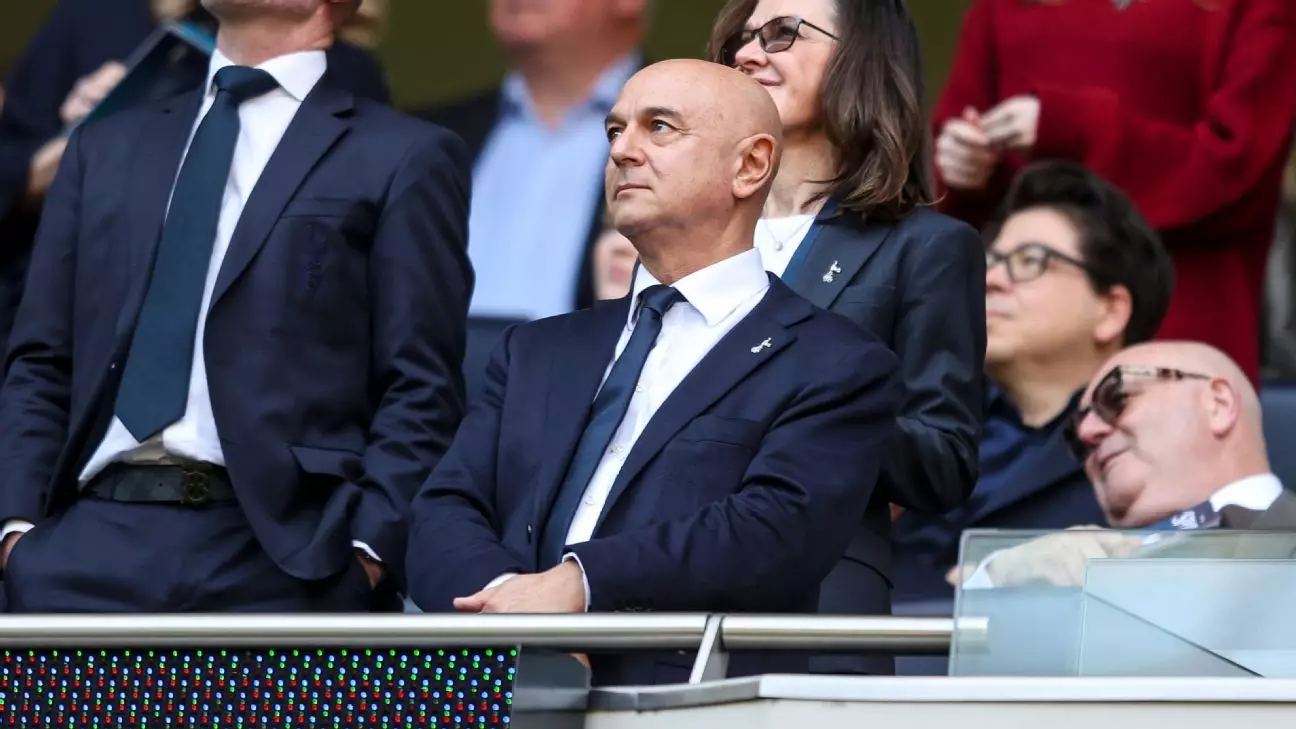Daniel Levy, the unyielding chairman of Tottenham Hotspur, has stood resolute amid the fervent scrutiny surrounding the club’s transfer strategy and financial decisions. In his recent statement accompanying the club’s annual financial results, he highlighted the complexities of navigating a challenging season—one that has placed Spurs in a precarious position, hovering just above the relegation zone in the Premier League (14th place). While fans and analysts alike dissect Levy’s every word, it is crucial to delve deeper into the implications of his remarks, particularly how they reflect the larger landscape of football finance in the current economic climate.
Levy’s assertion that the upcoming 2024-25 season poses significant challenges is not merely a rhetorical flourish; rather, it highlights the truth faced by many clubs in the modern game. The divide between the richest clubs and those struggling to keep pace has continued to widen, particularly with the advent of financial machinery that operates at breakneck speed. For Levy, advocating for sustainable spending seems to be both a shield against criticism and a genuine commitment to the club’s long-term viability. However, this raises an unsettling question: will a cautious approach lead to stagnation on the pitch, potentially sacrificing on-field success for financial stability?
The Fan Frustration: From Passion to Protest
Spurs’ loyal fanbase has long been a double-edged sword, passionate in their support yet vocal in their discontent. The protests against Levy and the club’s ownership reflect a growing impatience amid a perceived lack of ambition—a sentiment exacerbated by the club’s seemingly perpetual trophy drought. With 17 years without silverware, it’s no surprise that fans are disillusioned, especially when they watch rival clubs spend lavishly, increasing their trophy cabinets while Spurs wallows in mediocrity.
The departure of talismanic striker Harry Kane to Bayern Munich for a sizeable fee has only intensified frustrations. Although his exit was financially favorable, it has left a gaping hole in Spurs’ attacking lineup. The players brought in, such as Micky van de Ven and James Maddison, have shown potential, yet the on-field results have been inconsistent at best. This disparity between investment and output has fueled suspicions regarding Levy’s purported commitment to competing at the highest level.
Economic Realities: The Fight for Financial Stability
In his statement, Levy emphasized that Tottenham’s financial health must dictate their on-field aspirations. “We cannot spend what we do not have,” he stated, highlighting the club’s strategy of operating within their means. A sharp decline in revenue—from £549.6 million to £528.2 million in a year—further underscores the urgency of financial prudence in a sport increasingly obsessed with extravagant spending.
Spurs’ classification as the ninth richest club globally adds another layer to the narrative. While their financial stature suggests the potential for greatness, the reality is more nuanced. Financial sustainability does not simply hinge on wealth; it relies on creating a recurring income that outstrips expenditure. Levy’s approach may resonate with traditional supporters who value the club’s long-term security over short-term gains, yet many fans yearn for the exhilarating signings and flashes of brilliance that can reignite their passion for the game.
Performance Under Pressure: The Crossroads of Fortitude
While the financial outlook remains complex, one cannot overlook the central narrative—Tottenham’s performance on the pitch. Following a season of upheaval where manager Ange Postecoglou sought to implement his vision, the team is currently faltering, weighed down by a combination of injuries and systemic issues. With over half of their Premier League fixtures resulting in defeat, the mood has soured, and eyes have turned towards the Europa League as a potential lifeline.
Moreover, the struggles faced by the women’s team add another layer of drama, as they endure their own turbulent season, currently sitting ninth in the Women’s Super League. The atmosphere surrounding the club feels tumultuous, shifting between hope and despair, with manager Robert Vilahamn’s future hanging precariously in the balance.
For Spurs, the forthcoming matches against formidable opponents will either be a rallying cry for resurgence or a clarion call for deeper introspection. Their clash with Chelsea is not merely a game; it is a test of character, ambition, and the determination to rise from adversity.
A Brave New Era: The Long Road Ahead
As Levy’s statements reveal the broader complexities facing Tottenham Hotspur, it becomes evident that the seeds of change are desperately needed. While financial prudence is a virtue, it must not come at the cost of ambition. The upcoming months hold immense significance—not just for the club’s aspirations this season but for its long-term identity as a competitive force in the football landscape.
The challenge lies in balancing the need for immediate success with a vision that encompasses sustainable growth. As Tottenham navigates this pivotal phase, they must harness the unwavering support of their fervent fanbase, whose voices sing of both loyalty and longing. For any club aiming to achieve greatness, the pathway is fraught with difficulty, yet it is precisely through these trials that lasting legacies are forged. Spurs must choose whether they will remain merely participants in a race or become the champions they aspire to be.

Leave a Reply